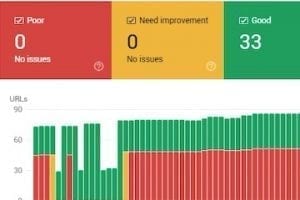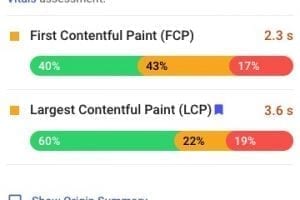Technical SEO
Technical search engine optimization refers to the structure and organization of a site for maximum search engine visibility. Our coverage addresses structured data (Schema.org), website hierarchy, menus, categories, page speed, bot crawlers (including Googlebot), domain names, and more.
-
 Technical SEO
Technical SEO
SEO How-to, Part 10: Redesigns, Migrations, URL Changes
August 4, 2020 • Jill Kocher Brown
Changes in content, linking, and URL structure can dramatically impact organic search performance. Thus it's critical to understand the search engine risks and rewards from a new design before you start developing it. This is the 10th installment in my "SEO How-to" series.
-
 Technical SEO
Technical SEO
SEO How-to, Part 9: Diagnosing Crawler Issues
July 27, 2020 • Jill Kocher Brown
Search engines must crawl and index your site before it can rank in organic search. Thus optimizing your content is pointless if search engines cannot access it. This is the ninth installment in my “SEO How-to” series.
-
 Technical SEO
Technical SEO
SEO How-to, Part 8: Architecture and Internal Linking
July 20, 2020 • Jill Kocher Brown
The structure of your ecommerce site — categories, subcategories, attributes — heavily impacts search engine optimization. This is the eighth installment in my “SEO How-to” series.
-
 Technical SEO
Technical SEO
Understanding Core Web Vitals for SEO
July 8, 2020 • Bill Sebald
On rare occasions Google provides expectations of upcoming algorithm changes. For example, Google alerted us to the mobile-first index change and, also, the inclusion of SSL signals. Once again, Google has given us a heads-up with Core Web Vitals.
-
 Technical SEO
Technical SEO
Assessing Google’s ‘Core Web Vitals’ on Shopify Themes
June 23, 2020 • Hamlet Batista
Google recently announced "Core Web Vitals," which are new performance metrics that will become a search ranking signal next year. Google displays the new metrics in Search Console, PageSpeed Insights, and the Chrome User Experience Report. “Page Speed Scores of Every Shopify Theme,” my article in April, included a table of those speeds at that time.
-
 Technical SEO
Technical SEO
SEO How-to, Part 2: Understanding Search Engines
May 21, 2020 • Jill Kocher Brown
Nearly half of shoppers turn to Google before deciding what to buy and where to buy it. Understanding how Google and other search engines work can help you choose which optimization strategies to apply. This post is the second installment in my "SEO How-to" series.
-
 Technical SEO
Technical SEO
SEO: Target Informational Rankings with Pillars and Clusters
April 21, 2020 • Jill Kocher Brown
Unless it's a major brand, an ecommerce site’s category and product pages may not rank organically for informational search queries. Creating pillar and cluster pages can help.
-
 Technical SEO
Technical SEO
The Role of Accessibility in SEO
April 14, 2020 • Bill Sebald
In the early years, search-engine optimizers typically equated accessibility with rankings. We focused on algorithms. A website that's accessible to users with disabilities would also be accessible to Google. Or so we thought. Things are different today.
-
 Technical SEO
Technical SEO
SEO: Auditing Backlinks with Google Search Console
April 12, 2020 • Jill Kocher Brown
The best backlinks are the ones search engines know about. Four reports in Google Search Console help analyze the strength of your backlink portfolio. Search engines use backlinks — the links from other sites to yours — in their algorithms as measures of value and authority.
-
 Technical SEO
Technical SEO
SEO: Manage Crawling, Indexing with Robots Exclusion Protocol
April 2, 2020 • Jill Kocher Brown
Indexing is the precursor to ranking in organic search. But there are pages you don’t want the search engines to index and rank. That’s where the "robots exclusion protocol" comes into play.
-
 Technical SEO
Technical SEO
SEO: Using Canonical Tags to Reduce Duplicate Content
March 23, 2020 • Jill Kocher Brown
Canonical tags are an essential tool to prevent duplicate content in organic search results. "Canonical" in search engine parlance means the one true page out of potentially many duplicates.
-
 Technical SEO
Technical SEO
SEO: 7 Ways Ecommerce Sites Create Duplicate Content
March 15, 2020 • Jill Kocher Brown
I've never worked with an ecommerce platform that was entirely free of duplicate content. Some platforms are better at containing the sprawl. But one change in the settings or the code could accidentally produce duplicates — i.e., different pages with different URLs for the same piece of content.
-
 Technical SEO
Technical SEO
SEO: Why Your Faceted Navigation Pages Aren’t Ranking
March 1, 2020 • Jill Kocher Brown
The filters and facets utilized by ecommerce sites allow shoppers to quickly narrow a product set by color, style, or other attributes. It's called faceted navigation. It's ideal for targeting keywords with midsized demand. And it can seriously boost organic search traffic.
-
 Technical SEO
Technical SEO
Analyze Competitors’ Breadcrumbs for Categories, Products
February 25, 2020 • Hamlet Batista
Knowing the breadcrumb navigation of your ecommerce competitors can be helpful. It could identify missing categories on your own site, navigation ideas, and even competitors' best-selling products.
-
 Technical SEO
Technical SEO
Google Downgrades Nofollow Directive. Now What?
February 24, 2020 • Jill Kocher Brown
On March 1, Google will no longer consider nofollow attributes as commands. Instead, they will be hints, much like canonical tags. Until now, nofollow attributes have been a protective barrier between your site's authority and the potentially questionable sites it links to.
-
 Technical SEO
Technical SEO
6 Ways to Know If Your SEO Is Broken
February 9, 2020 • Jill Kocher Brown
Gut feel. That's how ecommerce marketers sometimes gauge the health of their search engine optimization program. SEO contains many gray areas, for sure. But an evaluation requires data, not a hunch. Use these six methods — in order — to determine the health of your SEO program.
-
 Technical SEO
Technical SEO
SEO: 7 Shopper-grabbing Rich Snippets for Ecommerce
February 2, 2020 • Jill Kocher Brown
It’s increasingly difficult for organic search listings — the 10 blue links — to win the click. Rich snippets, which are powered by structured data, can make your links stand out. Here seven types of rich snippets that enhance blue links and thus drive clicks and sales.
-
 Technical SEO
Technical SEO
How to Rank in Google’s New Popular Products
January 19, 2020 • Jill Kocher Brown
Facing declining product searches thanks to marketplaces such as Amazon and Walmart, Google amped up its ecommerce search game last week with a new organic search feature: popular products.
-
 Technical SEO
Technical SEO
Speed Up Your Slowest Pages with Prefetching
January 3, 2020 • Hamlet Batista
In previous articles I’ve addressed ideas to improve page speed, such as with HTML caching and isolating slow loading resources. In this post, I'll explain how to determine your slowest pages and apply a simple fix to speed them up.
-
 Technical SEO
Technical SEO
5 Obstacles to SEO Success
December 20, 2019 • Jill Kocher Brown
I’ve worked in SEO for 14 years. In my experience, the following five deficiencies will likely block efforts to improve organic search performance
-
 Technical SEO
Technical SEO
Are SEO Audits Worth the Money?
December 17, 2019 • Bill Sebald
An SEO audit can cover any number of components — technical, content, competitive, backlinks, mobile, and analytics. Or it can be even more detailed. The risk of a generic SEO audit is that it scratches the surface, with little benefit.
-
 Technical SEO
Technical SEO
For SEO, How Fast Is Fast Enough?
November 3, 2019 • Jill Kocher Brown
Page speed improvements are high on most ecommerce to-do lists. The potential for increased revenue as well as better organic search rankings makes the effort worthwhile. But first, everyone wants to know how fast is fast enough.
-
 Technical SEO
Technical SEO
7 SEO ‘Rules’ to Ignore for Ecommerce
October 13, 2019 • Jill Kocher Brown
Search engine optimization tools have evolved into measuring hundreds of variables. But not all of them impact ecommerce performance in my experience. What follows are seven common SEO metrics to ignore, or relegate to a quick glance.
-
 Technical SEO
Technical SEO
Chrome’s ‘Mixed Content’ Updates Could Impact Ecommerce Sites
October 7, 2019 • Hamlet Batista
Google Chrome just announced important changes that could impact ecommerce. The changes address "mixed content" — sites with HTTP and HTTPS resources. In this post, I'll review steps to ensure the changes do not affect your ecommerce site come January.
-
 Technical SEO
Technical SEO
7 Coding Barriers to SEO Success
October 6, 2019 • Jill Kocher Brown
Googlebot obeys only certain commands, ignores forms and cookies, and crawls only the links coded with a proper anchor tag and href. What follows are seven items that block Googlebot and other search engine bots from crawling (and indexing) all of your web pages.
-
 Technical SEO
Technical SEO
Is Google’s Nofollow Change a Peek into SEO’s Future?
September 25, 2019 • Bill Sebald
Once again, we are faced with a change from Google. In a Sept. 10 post on its Webmaster Central Blog, Google stated that the nofollow attribute is now a hint instead of a directive. Here's the backstory.
-
 Technical SEO
Technical SEO
SEO: Catchall Redirects Are a Bad Practice
September 11, 2019 • Hamlet Batista
At first glance a catchall redirect page seems like a good solution. Instead of fixing thousands or tens of thousands of redirect errors, set up a simple catchall rule and send all users (and bots) to a single page. But it’s a bad idea.
-
 Technical SEO
Technical SEO
SEO: HTML, XML Sitemaps Explained
August 30, 2019 • Jill Kocher Brown
There are two types of sitemaps: HTML and XML. HTML sitemaps guide visitors, mostly. XML sitemaps guide search engine bots, to ensure they find a site’s URLs to index. Understanding the strengths and weaknesses of each will help with your search engine optimization.
-
 Technical SEO
Technical SEO
6-step SEO Indexation Audit for Ecommerce
August 25, 2019 • Jill Kocher Brown
Search engines need to index your site before it can rank. But it's not always obvious if a search index contains the correct pages. Content that should be indexed may not be. And content that should not be indexed often is. Use the following six steps to ensure that the right pages are indexed across your ecommerce site.
-
 Technical SEO
Technical SEO
8-step SEO Crawl Audit for Ecommerce
August 18, 2019 • Jill Kocher Brown
Your site won’t rank if search engine bots can’t crawl it. And hidden doors that don’t impact human visitors can lock bots out. Use these eight steps to ensure search bots can access all of your ecommerce site.